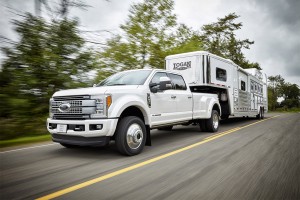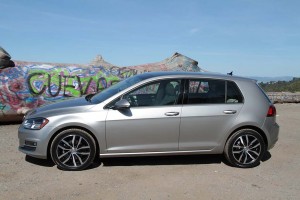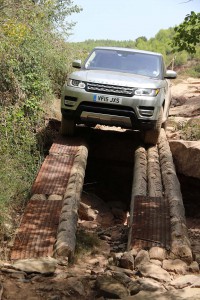For motorists looking for sporty but environmentally friendly alternatives to sluggish hybrids, diesels like the Volkswagen Jetta TDI has been a welcome addition to the U.S. market. The ability to deliver real performance along with high mileage is one reason why diesel sales have continued to grow even as demand for gas-electric models has plunged in the face of cheap gas.
But that growth spurt is likely to sputter out, industry insiders warn, in the wake of the Volkswagen cheating scandal. Last week, the Environmental Protection Agency ordered the recall of 482,000 VW diesel models, revealing that the maker had used software to scam the government’s emissions tests.
In real world situations, vehicles like the Jetta TDI actually produce up to 40 times the permissible level of noxious emissions.
“This is another black eye for diesels,” said Mike Jackson, CEO of Florida-based AutoNation, the country’s largest automotive retailer. “You now have a passionate constituency that feels betrayed.”
(CEO’s resignation just latest twist in VW scandal. Click Here for the latest.)
If the VW mess isn’t enough, a new report from Germany indicates the government has found that at least one diesel model sold there significantly exceeds European Union emissions standards – which are generally more lax on diesels than in the U.S. Government officials are now calling for random roadside checks to avoid the possibility other automakers secretly developed software to game the testing process.
In the late 1970s and early ‘80s, in the wake of twin Mideast oil shocks, high-mileage diesels experienced explosive growth. But the “oil burners” of that era were generally slow, noisy and foul-smelling. A variety of other problems caused the market to collapse here, especially as emissions standards were ramped up. By 2007, light-duty diesel sales – excluding a handful of heavy-duty pickups – fell to just 16,700.
In Europe, however, demand was soaring as a new generation of supposedly “clean diesels” was introduced. The technologies that helped make them more environmentally friendly – such as turbocharging – also boosted performance. In some cases, these new models also delivered highway mileage equal to comparable hybrids. By the beginning of this decade, roughly half of the vehicles sold in Europe were diesel-powered.
Though American and Asian makers were reluctant to return to the market here, German brands rushed over an assortment of diesel models. And sales started to take off, growing to 57,800 by 2009, and last year hitting 163,200, according to estimates from AutoPacific, Inc.
Until this week, the consulting firm was one of many to project even bigger growth as more manufacturers began to add new diesels. Fiat Chrysler scored a hit with the Ram 1500 diesel pickup, Chevrolet recently added a version of its Cruze sedan. Jaguar Land Rover is launching an array of diesel models, including the 2016 Range Rover TD6.
(Click Here for a review of the 2016 Range Rover Sport Td6.)
But such plans could be put in jeopardy by the VW brouhaha, warned AutoPacific’s Ed Kim. “The potential impact puts years of effort and millions of dollars of investments to waste,” he said.
With Volkswagen ordering at least a temporary hold on U.S. sales of its four-cylinder diesel models – which last year accounted for a quarter of its demand here – the numbers will take an immediate plunge, Kim said. But he doesn’t forecast much of a rebound, at least not initially.

Sales of heavy-duty trucks, like this Ford Super Duty are less likely to be impacted by the VW scandal.
AutoNation’s Jackson agreed, fearing potential buyers who wanted something efficient yet sporty will now be more reluctant to trust any manufacturer’s clean diesel claims.
During a Wednesday web conference, officials from the Washington-based Technology Forum attempted to put a more positive spin on the crisis, a statement from the trade group arguing that, “The circumstances involving a single manufacturer do not define an entire technology, or an industry. Vehicle manufacturers and engine makers have invested billions of dollars in research and development to successfully meet the most aggressive emissions standards in the world.”
But whether American motorists really will differentiate between brands is far from certain. And the situation would likely get only worse for diesel makers and proponents if BMW – or any other manufacturer – also proves to be missing those emissions standards.
Adding further downward pressure, petroleum prices are continuing to slide even as automakers introduce new gas-powered models that are getting better and better mileage, also without much sacrifice in performance.
Add it all up, said analyst Kim, “and this is going to push diesels back quite a few years.”
(Diesel still likely to be the engine of choice for 2017 Ford Super Duty. Click Here to check out the new pickup.)



A correction: the EPA has not issued a recall, only a notice of violation. http://www3.epa.gov/otaq/cert/violations.htm They are still doing their homework on next steps, which could include a recall, but no such recall has been issued.
If something bad happened to your car while parked, how would you know? Download the TextMyWheels free mobile app to get notified by text message or email. Optimized for Iphone and Android.
It’s stupid to say “This is another black eye for diesels,” when it’s not the diesels that are at fault. Making remarks like this makes it sound like diesels are evil beings that told us one thing when in reality they are something else.
It is apparent that VW can make a legal emission vehicle when all systems are working. The only issue is that VW lied to the public by saying they can have the best of everything (low emissions, high mileage and performance).
If anything one would think that these 482k vehicles would go up in value. Who is going to want to buy a properly running diesel that gets poor mileage and delivers less than adequate performance. For a car guy, the “defeat devices” can be considered as the ultimate performance chip (Passes Smog and delivers performance, without sacrificing mileage) from OEM with a warranty, cant beat that! The few vehicles that make it through this and have not been dumb down will be the ones to buy.
Actually, if there’s ever a good time to buy a diesel, strikes me it’s now and it’ll keep getting better for a while. But not the VW. At least, not one that’s been fixed. If they didn’t run awful when they ran right, they wouldn’t have broken them in the first place.
I agree that just because VW cheated on the operation of the emissions controls, it certainly does not detract from the inherent benefits of diesel use or ownership. As long as the vehicles comply with law via a software update without the defeat code included, they are perfectly fine and desirable vehicles. There are no reports that I am aware of with VW diesels running poorly with all functioning emissions controls. The defeat was probably for a slight increase in fuel economy which is a big deal to many people. I doubt many will give up their VW diesel for anything else.
It is extremely doubtful that VW can make the diesel meet the regualtions without a retrofit urea system. Until computerized engine controls were added to ICEs drivability and poor mileage was the norm gas or diesel. Direct injection for gasoline enginestook it to the last technical leap. Since diesels already had direct injection, the next tech was urea. Seems the VW management had a choice and picked the wrong direction. But it might seem cheap to retrofit if possible compared to poor drivability and poor mileage. Oh wait I believe they going to making EVs. No emission testing. Smart people.
DWH-
You are technically challenged on Diesels and many other subjects so I would like to inform you that VW has delivered some of the best driving diesel powered vehicles in the world starting back in the mid 70’s in the U.S. I know because I serviced many VW diesel vehicles in that era and actually owned one new in 1982. Read any new VW diesel reviews from the day for more proof.
With most any U.S. sold VW Rabbit getting 50+ mpg in 1978 with a perfectly fine driving experience, they were in high demand. VW could not produce them fast enough. Maybe U.S. cobbled together converted gas engines drove poorly but not the VW, M-B, Perkins, BMW or other Euro Diesels which were excellent, reliable diesels unlike the U.S. crap of the day.
In regards to petrol ICE’s, they ran just fine until the EPA decided they were excessively polluting the environment and car mfgs. were forced to Band-Aid carbs to try and reduce emissions. That was circa 1973 and when you opened the hood of a new vehicle there was what appeared to be a “road map” of the hoses and emissions controls stuck to the under side of the engine compartment hood for service purposes. U.S. consumers suffered dearly for the EPA’s ignorance in that era.
EFI was used by VW on a mass scale before any other auto mfg. circa 1968 in the U.S. The Bosch EFI systems when in proper condition ran well but were subject to electrical gremlins due to connector corrosion. VW stuck with Bosch EFI through the development of numerous designs and still uses Bosch EFI today as do many other car mfgs. around the world. EFI provided better fuel economy, power and lower exhaust emissions over carbs.
Direct injection of petrol engines is a double edged sword. It can increase power, lower emissions and fuel consumption but it also creates excessive carbon build up on intake valves and in the ports. Car mfgs. have been trying to find a solution to the excessive carbon build up in petrol DI engines and a few are using duel EFI systems where one is DI and one is port injection. This is a complex and expensive solution that does reduce the carbon build up.
As far as diesels and direct injection they went from mechanical F.I. to EFI. Urea injection was much later to meet more stringent exhaust emissions. When diesel engines changed to EFI the engine mfgs. were able to lower fuel consumption, lower emissions, lower noise, increase smoothness and increase power.
VW did not pick the “wrong one”. Virtually all of their diesel engines meet the relevant exhaust emissions. The EA 189 diesel engines have been produced in many variations and tested many times over the decades of sales by many independent sources in many countries. Urea injection reduces the cylinder head design challenges necessary to meet the more stringent emissions requirements, particularly NOx. Basically the CAT is scrubbed when the urea and H2O is injected thus lowering NOx but the carbon monoxide (yes THAT carbon monoxide) emissions increases some.
What VW did improperly was include code in their software that can reasonably conclude that an emissions test is being conducted. That in legal ease is deemed a “defeat device” under U.S. and EU emissions laws. That does not mean that VW actual installed or disabled any emissions control device. It means that the software code is a violation of the law if it can detect an emissions test is being conducted.
At this point it’s unknown if any VW diesels fail to meet the appropriate emissions requirements. The only violation that VW has admitted to is the test detection software code. For the vast majority of VW EA 189 engines, all they are likely to require is a simple and inexpensive software update without the test detection code. No one has yet publicly demonstrated that the exhaust emissions is in violation even though there are allegations regarding CA model VW diesels not running all emissions controls all of the time. If there are any models that do not comply VW is responsible to correct them. VW should have known better than to include the detection code but that does not in itself alter the exhaust emissions results or disable any emissions device.